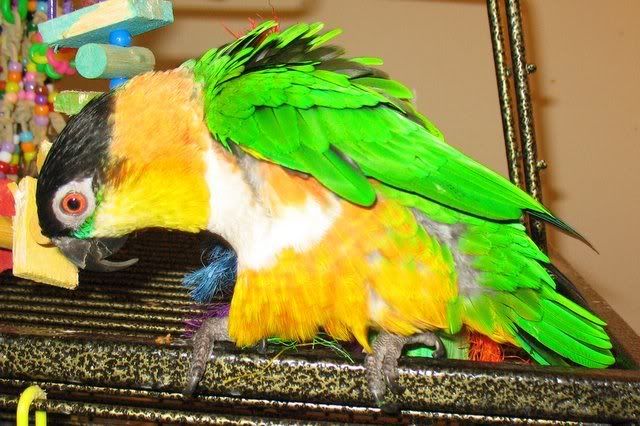Beloved Parrot asked, "question re Parrot Garden -- that looks like one fabulous place. Is that where you volunteer? If not, have you been there?Unfortunately, I do not live close to Parrot Garden. My good friend and I are planning a trip to visit there sometime in the next few months. She introduced me to Best Friends last year, and I am just so impressed with that organization. All of my parrots have virtually adopted one of their counterparts there, and I can't wait to meet them in person! I have brought up the topic of moving out there someday to Thomas, but not sure if that's feasible or not.
I so wish we had something like that here . . . sigh . . ."
Beloved Parrot (again!) wrote, "OMG! You use non-stick cookware with all those birds in your house? Surely you're aware of the dangers, right? And now they've found it doesn't have to heat up to 500 degrees; a pan with invisible scratches can off-gas at a much, much lower temperature.
I dumped ALL my non-stick stuff and now I use stainless steel and good ole' cast iron skillets. Believe it or not, I don't miss non-stick at all. Really.
And good luck with those hormonal parrots. I don't have as many parrots as you but sometimes it feels that way. And, like you, if I don't catch those tiny sudden warnings my flesh pays for it."
I am embarrassed to admit that we do have a few nonstick items that we are still using. We have switched over most of our equipment, but still have a few nonstick items that have stuck around (bad pun!!!) It's becoming a more important issue since we've been doing more cooking and baking lately.
Nonstick isn't just bad for parrots. It's also bad for people. I remember reading an article in National Geographic a few years ago that has stuck with me. Mark Bittman, my favorite cookbook author, also no longer uses nonstick items due to health risks for humans (or at least that's what he's written in his cookbook).
We've talked about this and will be eliminating all nonstick items from our house before the end of the year.
Doodlebird [Hi! Welcome to the blog!] wrote, "I recently was told that especially in Caiques, fruit (sugar) makes them very hormonal. I was told not to give mine any fruit when she goes through "spring fever". I don't know if it's true, but it was a pretty reputable source. Have you ever heard of such a thing?"
Hormones are such a tricky thing! I have heard this before. I've also had a long talk with an avian vet about how we humans, in providing our birds with the best life we can for them in captivity, essentially put them almost constantly in the mood to breed. Abundant food, plentiful showers, long periods of light, and other factors combine to make them think it's Spring year-round. I don't know what the answer is! I do try to maintain consistently 12 hours of darkness for them to sleep, but I'm not going to withhold food for a few days or provide a low quality diet to help simulate the harshness of winter!
I think it's something you can definitely try to see if anything improves. You never know what will work with each individual bird! My parents had a quaker who exhibited extremely aggressive behavior anytime he had any white flour or white sugar, whereas other quakers can eat those things with no adverse effects.
Now for the caiques in my house. Calypso (he is 13 now) has not gotten hormonal for several years. Beeps, my 10 year old, is majorly hormonal right now. I did try reducing the amount of fruit in his diet, but it did not seem to have any impact on him. Since he likes fruit so much, it's back in his diet. The way we're dealing with him is by closely monitoring his body language so we don't get bit and hoping that his season comes to an end shortly!


1 comment:
Well I haven't had any problems with Nani yet as far as hormones go, she's only 6 months old, but I was asking someone about their two Caiques and that's when they told me about the fruit thing. It's strange though, because everything i read about Caiques in the wild (which is next to nothing) says they eat a lot of fruit in their diet. I suppose because they are so active they need a bit more "energy" than other parrots.
Post a Comment